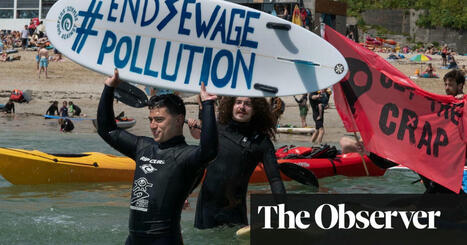|
Will rising debt cause Thames Water to sink under a Labour government? | Thames Water | The GuardianFrom www The crisis-hit utilities company could quickly spoil the post-election mood for whichever party wins next week Graham Watson's insight: Another look at Thames Water, with some industry insiders suggesting that the company could be on the point of going bankrupt, and one of the first items on the agenda for a new government. It raises all sorts of questions about the water industry, privatisation and renationalisation, and the nature of modern business. No comment yet. Sign up to comment
From www Polyester is one of the most popular fabrics in the world. Made from PET plastic, it is prized for its durability, lightness, and low cost of production. While these characteristics make it ideal for various uses across the textile industry, the oversupply of polyester has also fueled an environmental disaster. Now, brands like Adidas, Nike, and Shein are trying to increase the amount of polyester made from recycled plastics -- but is this the best use of old plastic? We visited Tamil Nadu, India, to see how one company makes clothing from used plastic bottles and whether this is the best solution for this waste stream. Graham Watson's insight: This Business Insider looks at how an Indian firm are turning 1.5m plastic bottles per day into polyester, and they're only going to produce more, looking to triple output in the next two years. It's a lovely example of the circular economy, and recycling waste plastics into clothing. No comment yet. Sign up to comment
From www GambleAware says government has ‘overlooked’ the problem and calls for pre-watershed advertising ban Graham Watson's insight: GambleAware are calling for tougher restrictions on gambling advertising at sporting events, arguing that both that it is supported by the public and contributes to the negative externalities associated with problem gambling. But the fact that the former is given such prominence might get you thinking about whether this is good economics or not. No comment yet. Sign up to comment
From www Editorial: Seventy years after research linked cigarettes with cancer, tighter controls have been delayed once again Graham Watson's insight: A potted history of a classic demerit good, cigarettes, looking at how the negative externalities of tobacco were overlooked for such a long period and whether or not the new Labour government is going to resurrect the plan to make it "illegal to sell tobacco to anyone born since 2009". However, you might weigh up whether this, and tighter controls on vapes are necessarily good economics. No comment yet. Sign up to comment
From www Service ratings across energy sector between January and March among lowest ever, says Citizens Advice Graham Watson's insight: I look at the issue of customer service in the energy sector as a proxy for dynamic efficiency. Where complaints are low, firms are responsive to changing market dynamics. However, what's always interesting is that large energy suppliers always seem to do badly in these sorts of survey, which implies that either they spend less - per capita - on customer service, but that it costs them less in terms of lost customer revenue. And, oddly, it's an indication of the fact that the optimal level of customer complaints isn't zero - I wonder if you can apply marginal principles in this regard? No comment yet. Sign up to comment
From www Spanish city is one of Europe’s top destinations but its popularity has made housing increasingly unaffordable for residents Graham Watson's insight: If you know, you know. This subject is just fantastic. This article highlights a supply issue in Barcelona, and an intervention to ban apartment rentals to tourists in the hope of increasing the supply of apartments for its residents. However, is this good economics? It's an interesting exercise in thinking about the opportunity cost of policy and how the law of unintended consequences might take effect. No comment yet. Sign up to comment
From www It’s not a sexy subject in an election campaign, but the inefficiency of Britain’s housing stock is a crisis in waiting Graham Watson's insight: This article highlights a policy bias in favour of the eye-catching rather than the banal, noting that in the search for increased energy efficiency, we're too keen to look at promoting renewable energy rather than insulating of housing stock. As the article notes: "Britain’s home insulation efforts have collapsed in recent years. After reaching a peak in 2012 of 2.3m upgrades, thegovernment slashed efficiency programmesin the same year, leading to a slump in home upgrades. By 2021, annual installations were96% lower, at fewer than 100,000." No comment yet. Sign up to comment
From www Report finds developing countries are increasing reliance on coal, gas and oil as overall demand for energy rises Graham Watson's insight: For all the good news about the green transition, it's still the case that fossil fuel use is rising. It's an interesting story but not surprising: a growing economy is going to demand more energy and, at present, its easiest to revert to fossil fuels. No comment yet. Sign up to comment
From www Margins are rising amid the election "distraction", the group says, but retailers say they face higher costs. Graham Watson's insight: The RAC are concerned that the UK's motorists are being exploited by fuel retailers who've been able to increase their profit margins in the wake of the Ukraine war and now, the turmoil of the General Election campaign. They point out that not only does the UK have the most expensive fuel in the UK, but that petrol prices in Northern Ireland are 5p cheaper than the rest of the country. Of course, this issue has already been investigated by the Competition and Markets Authority and there's concern that profit margins are well above historic norms. The retailers, though, argue that higher prices reflect higher costs, and not just the wholesale price of fuel. No comment yet. Sign up to comment
From www Editorial: Labour should take lessons from the Netherlands, where public sector firms are funded by a state-owned bank Graham Watson's insight: The Guardian evaluates the UK's decision to privatise water, and notes how we are an outlier. 90% of economies have state-owned water companies and no-one else in Europe has privatised their water infrastructure - reservoirs, sewage pipes and so on. So, how has the market performed? It notes a lack of investment and unfavourable comparisons with the state-owned water industry in the Netherlands, where rates of leakage are less than a quarter of those in the UK. No comment yet. Sign up to comment
From www GambleAware signals collision course with industry as charity brands current warnings ‘inadequate’ Graham Watson's insight: Campaign group, GambleAware, are looking for the government to intervene and regulate advertising of the sector in the run-up to the Euros. They argue that the demerit nature of gambling should be emphasised in the same way that the health risks of smoking at made explicit on advertising. However, is it good economics? No comment yet. Sign up to comment
From www The rate of increase is the slowest for 30 months, but competition among potential tenants is still fierce. Graham Watson's insight: D&S and the housing market, in this case the rental sector. Basics. alexavegas857@gmail.com's comment,June 10, 7:08 PM ALEXAVEGAS ✅ SITUS TERPERCAYA ✅ LINK DAFTAR | LOG IN | ALTERNATIF ✅ RTP ✅ SLOT ✅ CASINO ✅ TOGEL ✅ 2024 ✅ 2025 ✅ THAILAND ✅ MALAYSIA ✅ INDIA ✅ FILIPINA ✅ INDONESIA ✅ ✅ Link Daftar ALEXAVEGAS �https://bit.ly/alexavegas88 PROMO SPESIAL CASHBACK DAN ROLINGAN BONUS BEBAS BUY SPIN, ✅ Minimum Deposit 5RB SALAM JP & MAXWIN Sign up to comment
From www Food prices, including a $40 chicken, has stoked fury and calls for big foreign supermarket chains to come to Canada. Graham Watson's insight: Economic gold here, with an article that highlights the impact of a high degree of concentration in the Canadian grocery market and higher prices as a result. The Canadian market is dominated by three major players - Loblaw, Empire and Metro who control over 60% sales, with Walmart and Costco accounting for a significant proportion of the remaining sales. In contrast, the US has a larger number of regional players and in the UK there are 14 companies which have more than £1bn worth of sales. However, breaking into the Canadian market is more complicated than most people think and this might have precluded any one of a number of international chains from trying to establish a foothold there, despite attempts by the Canadian government to woo discounters like Aldi and Lidl As a result, Canadians have less choice and higher prices, both a consequence of a lack of competition. No comment yet. Sign up to comment |
From www There are just 300 electric HGVs in the 500,000-strong lorry fleet – and only one public charging point, says RHA Graham Watson's insight: And as we electrify our cars, the same is going to happen to HGVs, although at present, there are only 300 electric HGVs in the country and one public charging point. As a result, the haulage industry is calling for government investment in the sector to help the transition to an electric future. No comment yet. Sign up to comment
From www Workers are told the firm is taking steps to potentially cease operations at the plant by 7 July. Graham Watson's insight: Told you so... It's almost as if Unite wanted to trigger this. No comment yet. Sign up to comment
From www Boom in air cargo due to shoppers’ expectations of speedy delivery and shift in post-pandemic economy, researchers say Graham Watson's insight: The air freight sector has seen a marked - 25% - increase in carbon emissions since 2019. There has been a 30% increase in flight volumes. Air freight produces 80% more carbon than sea and trucks do. However, our increased desire for next-day delivery has meant that there's an increased volume of parcels, with some research predicting that parcel numbers might reach 800bn by 2030, up from 315bn in 2022. No comment yet. Sign up to comment
From www European Commission accuses tech company of illegally linking chat and video app with Office 365 products Graham Watson's insight: It seems that Microsoft is likely to fall foul of the European Commission because of the way that it's linked the chat and video app, Teams, with its suite of Office 365 products. The EU will argue that this has reduced competition and consumer choice, in messaging and related markets, reducing economic welfare. No comment yet. Sign up to comment
From www It is the first time a company has been found to be in breach of the Digital Markets Act (DMA). Graham Watson's insight: Apple has, once again, incurred the wrath of the EU Commission, with App Store reported to be in breach of the Digital Markets Act (DMA). The issue is that App Store seems to be accused of reducing competition by not making it clear that there are other, cheaper App Stores. In addition, the 30% average commission that App Store charges is seen by some as the company exploiting its market power again. Of course, Apple are claiming that they comply with the rules - but if they are found guilty, they could be fined 10% of their global revenues. No comment yet. Sign up to comment
From www Water companies have logged five sewage spills a day, every day, for a decade, analysis by the Observer shows Graham Watson's insight: An Observer investigation looks at the true extent of sewage spills, and concludes that the industry has significantly understated them. It reflects a lot of things, the ageing nature of the infrastructure, and, dare I say it, a failure of regulation. I'd also love to say that the extent of marine pollution beggars belief. But it doesn't, does it? No comment yet. Sign up to comment
From www It is the first time in 40 years that UK steel workers have taken strike action. Graham Watson's insight: I could put this in the Macroeconomic section of the board - however, I put it here to show how industrial action is the last thing that unions often want to do. In this case, Tata workers at Port Talbot are going on strike for the first time in 40 years; but it's not from a position of strength. The indefinite strike is a response to proposed job losses. but it would interesting to know what the workers are hoping to gain. To an outsider, I think that it's likely to strengthen the resolve of the company to press ahead and potentially make them ever more likely to close the whole plant going forward. No comment yet. Sign up to comment
From www Nickel is a critical component of the batteries that power electric cars, and Indonesia has become a global giant in producing the mineral. But there is a dirty and sometimes deadly secret behind this success story. Environmentalists accuse Indonesia's nickel industry of flouting regulations intended to protect ecologically sensitive islands, and fatal accidents at Chinese-owned mining facilities are not uncommon. Bloomberg News looks into how a key part of the green transition is coming with such a high price. Graham Watson's insight: What is the true cost of electric cars? It seems that their environmentally-friendly credentials are less than impeccable when it comes to their manufacture. Bloomberg news looks at how the Indonesian nickel industry has seemingly ignored environmental legislation to extract nickel. No comment yet. Sign up to comment
From www Spain is looking at storing electricity or increasing demand to solve electricity oversupply. Graham Watson's insight: Can you have too much green energy? It seems that you can with Spain's green generating capacity having expanded rapidly since 2008, to the extent that it's now has Europe's second largest renewable energy infrastructure and that, at times, its capacity to supply electricity exceeds the demand for power. However, this has had an interesting effect on the electricity market, meaning that the price of electricity can even effectively be negative on occasions. No comment yet. Sign up to comment
From www How artificial intelligence is increasingly helping the arable farming sector. Graham Watson's insight: This BBC article looks at the the impact of climate change on agriculture and how the sector is fighting back, using AI and innovating to devise new weather-resistant crop types to help the sector overcome these challenges. No comment yet. Sign up to comment
From www Farmers and researchers tell of the impact of a rapidly changing climate, and the measures being taken to adapt Graham Watson's insight: Climate change and prosecco. Either way, the supply of grapes for prosecco has fallen and there are obvious microeconomic consequences of this. No comment yet. Sign up to comment
From www Atsushi Katsuki tells the BBC the firm sees the sober generation as both a risk and an opportunity. Graham Watson's insight: Again, the multi-faceted nature of this fantastic subject is showcased here, with changing consumer tastes posing an interesting challenge for established brewers looking to enhance their low and zero alcoholic drinks. This reflects changing social and business norms, and could even prompt candidates to do a Business Management IA on the topic. No comment yet. Sign up to comment |
How 1.5 Million Plastic Bottles Are Turned Into Clothing Every Day | World Wide Waste | Microeconomics: IB Economics (2024)
References
- https://www.scoop.it/topic/microeconomics-pre-u-economics/p/4154035152/2024/06/28/how-1-5-million-plastic-bottles-are-turned-into-clothing-every-day-world-wide-waste
- https://www.trojanfitness.com.au/blogs/blog/are-acai-bowls-healthy-complete-guide-by-trojan-fitness
Author: Saturnina Altenwerth DVM
Last Updated:
Views: 6578
Rating: 4.3 / 5 (44 voted)
Reviews: 91% of readers found this page helpful
Name: Saturnina Altenwerth DVM
Birthday: 1992-08-21
Address: Apt. 237 662 Haag Mills, East Verenaport, MO 57071-5493
Phone: +331850833384
Job: District Real-Estate Architect
Hobby: Skateboarding, Taxidermy, Air sports, Painting, Knife making, Letterboxing, Inline skating
Introduction: My name is Saturnina Altenwerth DVM, I am a witty, perfect, combative, beautiful, determined, fancy, determined person who loves writing and wants to share my knowledge and understanding with you.
 Your new post is loading...
Your new post is loading... 




















